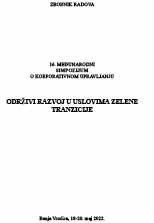NOVA EKONOMIJA POSLE KRIZE U SISTEMU KRIZA 2008–
NEW ECONOMY AFTER A CRISIS IN THE SYSTEM OF CRISES 2008–
Author(s): Dragan Đuričin
Subject(s): Economy, National Economy, Socio-Economic Research
Published by: Finrar d.o.o Banja Luka
Keywords: Serbia’s economy; complex crisis; economics paradigm; circular economy; heterodox economic policy platform; automatic macroeconomic stabilizers; financing of green transition;
Summary/Abstract: We are living in bewildering times full of contradictions and conflicting signals. The new normal that started in 2008 and still continues (or the crisis 2008-) is a complex crisis, a crisis in the system of crises. In such a context, economic crisis is just one of many crises. To prevent regression, an immediate transition toward a new economic order is needed. The effects of this transition far outweigh the cost of inaction. We must finally leave behind market fundamentalism and the so-called “Washington Consensus” because the sustainability of economy and nature is threatened. Namely, the world is at war with (human) nature. The current paradigm, both in macroeconomics and microeconomics, cannot solve the structural imbalances that are caused by following its own nexus of rules. A new approach in economics, promoting “doing good” (environmentally, ethically and socially) is actually complementary, rather than in contradiction, with “doing well” (strictly economically). No company is a hermetically sealed system. Each company affects and is affected by its environment. So, the great reset requires a double paradigm change. The paradigm change in macroeconomics calls for the replacement of gross domestic product maximization as the ultimate goal of every national economy with sustainable development goals (SDGs) and the introduction of the “visible hand” of the state, as a new coordination mechanism, along with the “invisible hand” of the market. Extending the performance measurement system from financial profit to the measures that respect the limits of nature, or environmental, social and governance (ESG) performance measures, is related to the paradigm change in microeconomics. In a changing context, financing of the so-called “green transition” is essential. It is a lever enabling the transition of the economic system from the new normal to a better normal through new industrialization. To achieve growth in the SDG framework, it is necessary to endogenize externalities and make sure that the system of national accounting is adjusted to reflect all relevant economic benefits and costs of investments. To make the economy more sustainable and the planet a better place to live in, the paradigm in economics must change. Economic sustainability means mitigating structural imbalances from the past, governing the new economic system toward SDGs and measuring success in line with ESG concerns. The current stage in economic development and macroeconomic specifics determine the scope and dynamics of transformation programs. In our paper we illustrate this by using Serbia’s specifics.
Book: 16. MEĐUNARODNI SIMPOZIJUM O KORPORATIVNOM UPRAVLJANJU
- Page Range: 7-23
- Page Count: 17
- Publication Year: 2022
- Language: Serbian
- Content File-PDF

